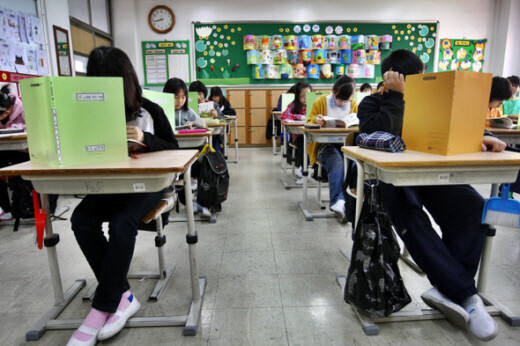hankyoreh
Links to other country sites 다른 나라 사이트 링크
Survey shows lower quality of life in S. Korea

While overall economic living conditions in South Korean society have improved over the past 20 years or so, a weakened sense of community consciousness and social unity has led to a more degraded quality of life, recent analyses suggest.
The Korean Sociological Association and the Statistics Research Institute held a conference Friday on the topic of “Social Trends and Quality of Life in South Korea” at the Press Center in Seoul's Taepyeongno. The conference features presentations and a debate analyzing issues of quality of life in areas such as education, labor and the home.
At the conference, Seoul National University sociology professor Park Keong-suk presented a “standardized index of quality of life” based on data from social statistics surveys by the Korea National Statistical Office (KNSO) 1990 to 2008. The survey identifies 10 areas indexed with values from 0 to 1, including income, environment, politics and economy.
“The results of the analysis show some low-level increases. For example, the degree of satisfaction with old age income increased from 0.33 in 1994 to 0.35 in 2007, and the rate of home ownership rose from 0.52 in 1997 to 0.66 in 2004. The results also show a deteriorating tendency in integrated economic indices, for example, in a sense of belonging to a community, satisfaction with leisure time use, and sense of care giving,” Park said.
Education issues are also having a large effect on quality of life. Korea University education professor Kim Kyeong-keun has analyzed the relationship between education and quality of life using data from a social statistics survey published by the KNSO last year. “Among young people, 15 and older, the degree of life satisfaction dropped as they got older because of stress from college entrance exams,” Kim explained.
Improvement in residence and attainment of higher degrees of education among parents were associated with higher subjective assessments of quality of life by young people, but this satisfaction was not a factor associated with better health conditions and reduced lifestyle stress, Kim noted.
Kim also said, “The greater the burden parents felt with outlays for their children’s education, the lower subjective ratings of quality of life were. This corroborates the idea that the burden parents must bear for their children’s education has a major effect on quality of life.”
Meanwhile, other analyses show a steady rise since 1990 in satisfaction with family life and a major increase with women in the middle class and higher regarding their economic activity.
Please direct questions or comments to [englishhani@hani.co.kr]
Editorial・opinion
![[Column] Park Geun-hye déjà vu in Yoon Suk-yeol [Column] Park Geun-hye déjà vu in Yoon Suk-yeol](https://flexible.img.hani.co.kr/flexible/normal/500/300/imgdb/original/2024/0424/651713945113788.jpg) [Column] Park Geun-hye déjà vu in Yoon Suk-yeol
[Column] Park Geun-hye déjà vu in Yoon Suk-yeol![[Editorial] New weight of N. Korea’s nuclear threats makes dialogue all the more urgent [Editorial] New weight of N. Korea’s nuclear threats makes dialogue all the more urgent](https://flexible.img.hani.co.kr/flexible/normal/500/300/imgdb/original/2024/0424/7317139454662664.jpg) [Editorial] New weight of N. Korea’s nuclear threats makes dialogue all the more urgent
[Editorial] New weight of N. Korea’s nuclear threats makes dialogue all the more urgent- [Guest essay] The real reason Korea’s new right wants to dub Rhee a founding father
- [Column] ‘Choson’: Is it time we start referring to N. Korea in its own terms?
- [Editorial] Japan’s rewriting of history with Korea has gone too far
- [Column] The president’s questionable capacity for dialogue
- [Column] Are chaebol firms just pizza pies for families to divvy up as they please?
- [Column] Has Korea, too, crossed the Rubicon on China?
- [Correspondent’s column] In Japan’s alliance with US, echoes of its past alliances with UK
- [Editorial] Does Yoon think the Korean public is wrong?
Most viewed articles
- 1[Column] Park Geun-hye déjà vu in Yoon Suk-yeol
- 2Thursday to mark start of resignations by senior doctors amid standoff with government
- 3N. Korean hackers breached 10 defense contractors in South for months, police say
- 4Kim Jong-un expressed ‘satisfaction’ with nuclear counterstrike drill directed at South
- 5[Editorial] New weight of N. Korea’s nuclear threats makes dialogue all the more urgent
- 6Will NewJeans end up collateral damage in internal feud at K-pop juggernaut Hybe?
- 7[Column] ‘Choson’: Is it time we start referring to N. Korea in its own terms?
- 8[Editorial] Japan’s rewriting of history with Korea has gone too far
- 9[Cine feature] A new shift in the Korean film investment and distribution market
- 10[Column] The president’s questionable capacity for dialogue